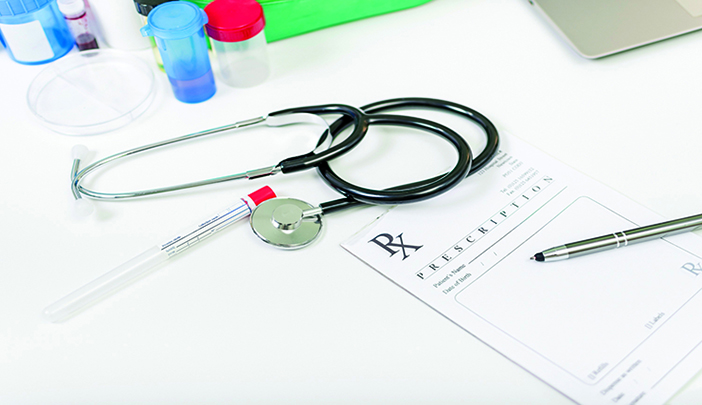Med students learn to prescribe medication-assisted therapy for opioid use disorder.
In the first program of its kind in the country, more than 30 members of the Class of 2018 at the Warren Alpert Medical School will receive training to prescribe FDA-approved medications for the treatment of opioid use disorders.
The Drug Abuse Treatment Act of 2000 (DATA 2000) requires physicians to obtain a waiver to prescribe the medications. With the training they receive at Brown, the medical students will be able to apply for the waiver once they graduate and receive their full medical license and Drug Enforcement Administration registration.
The state of Rhode Island and the Medical School created the program, outlined in a report in the American Journal on Addictions in April, to increase the number of DATA 2000-waivered physicians who could gain additional experience in treating substance use disorders during residency and provide access to clinical care. Training for the DATA 2000 waiver typically i s not available to doctors until they are
practicing. In future years, the program will extend to the entire Medical School class.
“Not only does the DATA waiver program allow Alpert Medical School students to graduate having met the educational requirements for office-based treatment of opioid use disorder, but it also helps to bring treatment of substance use disorders into mainstream medicine and helps the students develop a greater sense of confidence in their ability to treat the disorder,” says Elinore McCance-Katz, MD, PhD, professor of psychiatry and human behavior and co-creator of the DATA 2000 waiver program. (McCance-Katz is now
the assistant secretary for mental health and substance use in the US Department of Health and Human Services, where she advises the HHS secretary on behavioral health care.)
The mechanism for DATA waiver qualification applies only to physicians practicing in Rhode Island, but the
Rhode Island Department of Health will encourage other states to consider partnering with their medical schools to certify addiction medicine curricula that would qualify for a DATA waiver, too.
Training students in this way is important in addressing the opioid epidemic, says Paul George, MHPE ’01 MD’05 RES’08, assistant dean for medical education and associate professor of family medicine.
“Hospitals and health care facilities are being overwhelmed by individuals who are seeking treatment for opioid use disorders, and they cannot meet the demand,” he says. “This program is a significant step forward in increasing the number of physicians who can prescribe medications to treat opioid use disorders. My hope is that other medical schools will partner with their state governments to develop similar programs.”




